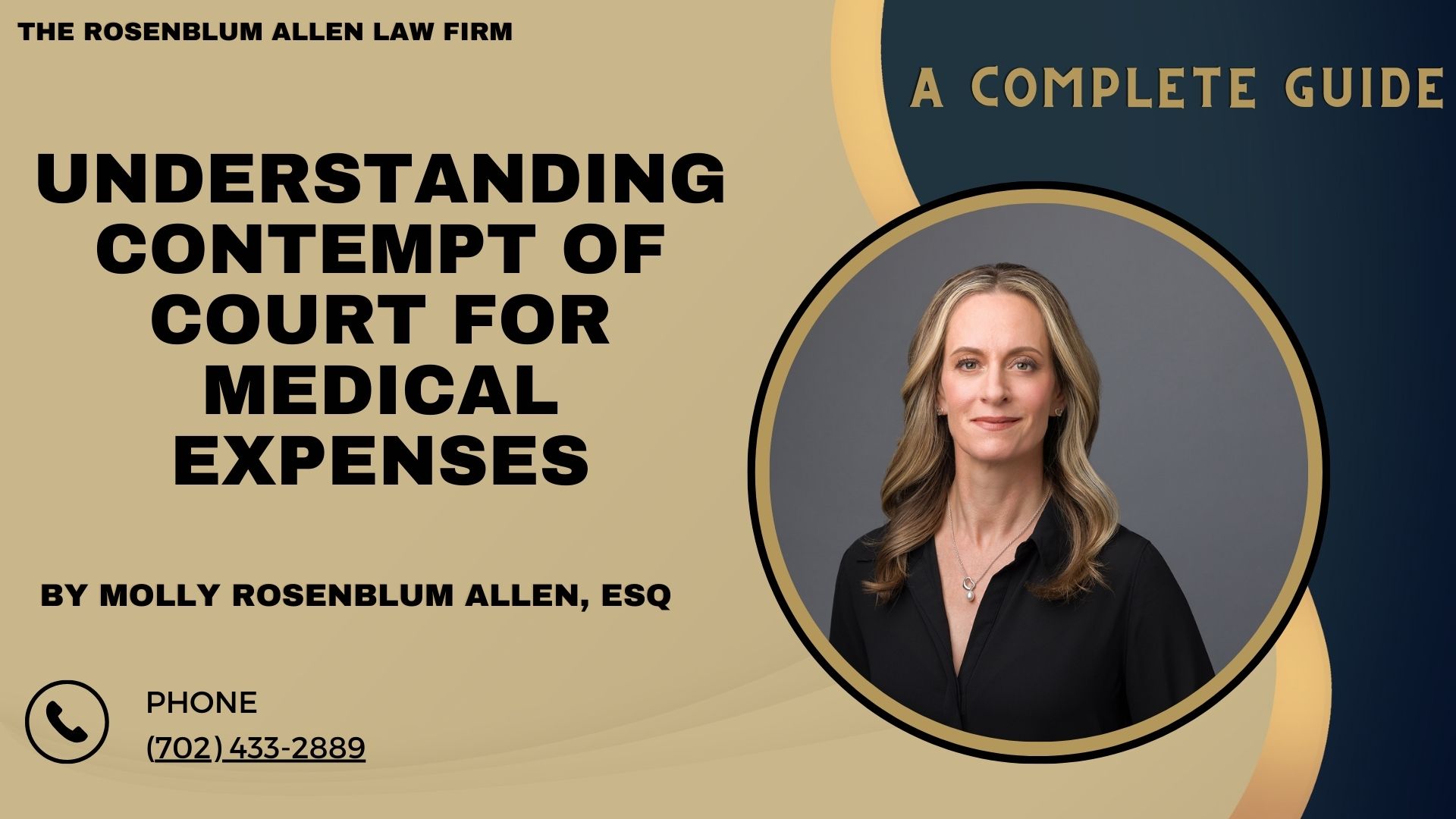“Contempt of court” may bring to mind dramatic courtroom scenes from media. In real life, family law and medical expenses have high stakes. The drama is intense for those involved. This guide explains contempt of court for medical expenses, helping you navigate confidently. At its core, being in contempt of court means failing to follow a court order. In family law, these orders often pertain to financial responsibilities, including medical expenses. Understanding your obligations is crucial. It may involve ensuring your child gets needed medical care. You might also need to cover part of your ex-spouse’s health bills per your divorce agreement.
 Definition of Contempt of Court
Definition of Contempt of Court
Contempt of court is a legal finding that someone has disobeyed a court order. The court enforces compliance to ensure that people follow orders. Someone may face contempt for failing to meet court-ordered healthcare financial responsibilities.
Overview of Medical Expenses in Family Law
Family law medical expenses cover routine doctor visits, prescriptions, and major treatments. This includes surgeries. Divorce or child support expenses can be contentious and burdensome. One party may be legally obligated to contribute to medical costs.

The Legal Basis of Contempt in Family Law
Understanding contempt in family law helps you see the seriousness of obligations. This will also reveal the potential consequences of not meeting them.
Explanation of Family Law Orders
Court’s legal decisions govern family members’ relationships and responsibilities. This includes divorce decrees, child support orders, and financial family rulings.
Child Support and Medical Expenses
Often, child support orders will outline medical expense responsibilities. One parent provides health insurance. More complex arrangements share out-of-pocket costs.
Alimony and Medical Expense Responsibilities
Alimony agreements may cover medical expenses if a spouse lost health insurance.
What Constitutes Contempt of Court?
Contempt of court means not following legal financial responsibilities.
Failure to Pay Court-Ordered Medical Expenses
If you fail to pay certain medical expenses that a court has ordered you to pay, you could be found in contempt. This includes direct payments for medical services and insurance coverage payments.
Non-Compliance with Healthcare Insurance Requirements
Lack of court-ordered health insurance for a dependent or ex-spouse can result in contempt proceedings. It fails to follow the court’s directive. The court ordered appropriate medical care.

Consequences of Being Found in Contempt for Unpaid Medical Expenses
Facing the music isn’t fun, especially involving the legal system. Not paying medical expenses can lead to financial penalties or stricter enforcement.
Financial Penalties and Reimbursement Orders
When it comes to your wallet, the consequences can be quite direct:
Fines and Legal Fees: Courts can impose fines for contempt, and you might also be ordered to cover the legal costs incurred by the other party in bringing the contempt motion.
Compensation for Uncovered Medical Expenses: Besides fines, you may be ordered to reimburse any medical expenses the other party had to cover due to your non-payment.
Enforcement Measures
The court doesn’t just ask nicely; it has tools to enforce its orders:
Wage Garnishment: A portion of your paycheck might be directed towards covering the unpaid expenses.
Property Liens: A legal claim could be placed on your property as security for the debt.
Bank Account Seizure: Funds could be taken directly from your bank accounts to cover the debt.
Incarceration and Probation
In extreme cases, the court can decide that a more direct approach is necessary:
Jail Time: You can be jailed for contempt of court, serving as a last-resort incentive to comply with the order.
Conditional Release: Sometimes, the court may opt for probation, setting specific conditions you must meet to avoid jail.

Legal Proceedings for Contempt of Court for Medical Expenses
You must understand the process if you face a contempt motion or plan to file one.
Initiating a Contempt Motion
The first step in the dance of legal proceedings:
Preparing Documentation: Gather all documents proving the existence and terms of the court order, along with evidence of the non-compliance.
Filing the Motion: The motion is filed with the court, officially starting the legal process.
The Court Hearing Process
This is where you tell your side of the story, but so does the other party:
Presenting Evidence: Both parties can present their evidence and arguments to the court.
Defense Strategies: If you’re accused, this is your chance to explain your side, perhaps showing attempts to comply or reasons for non-compliance.
Post-Hearing Outcomes and Appeals
After the hearing, the judge will make a decision:
Compliance and Payment Plans: The court might offer a way to comply with the order, such as setting up a payment plan.
Appealing a Contempt Finding: If you believe the decision was unjust, you can appeal to a higher court.

Preventive Measures and Solutions
Better safe than sorry, as they say. Take steps to avoid contempt for unpaid medical expenses.
Understanding Your Legal Obligations
Know what you’re supposed to do before it becomes an issue:
Reviewing Court Orders: Make sure you fully understand the terms of any court order related to medical expenses.
Consulting a Legal Professional: When in doubt, a family law attorney can offer advice tailored to your situation.
Negotiating Medical Expenses and Modifications to Court Orders
Life happens, and sometimes changes are needed:
Mediation and Settlement: Before things escalate, consider mediation to renegotiate the terms in a way that works for both parties.
Requesting Modification of Orders: If your financial situation changes, you can petition the court to modify the order accordingly.
Understanding your responsibilities, potential consequences, and the legal process empowers you. Take control of the contempt of court situation. It can feel overwhelming to navigate unpaid medical expenses. Knowledge is crucial when facing contempt charges or pursuing legal action. Your best ally is knowledge. Seek legal advice from a professional when dealing with intricate legal matters.

Case Studies and Real-Life Examples
Learning from others can offer valuable insights. It can also provide comfort by showing you’re not alone.
Successful Contempt Actions for Medical Expenses
John, a single father, filed a contempt motion. His ex-wife didn’t pay their son’s medical bills. The court ordered reimbursement with detailed documentation. It also established a more enforceable payment structure. This case highlights the importance of precise record-keeping and following legal procedures closely.
Avoiding Contempt through Proactive Measures
“Emma” couldn’t afford the medical expenses in her divorce decree. She promptly sought legal advice. She communicated with her ex-spouse. She filed for a court order modification. Her proactive approach led to a mutually agreeable solution that prevented contempt charges. Emma’s story highlights communication’s value. It emphasizes acting early to prevent escalation.

Breaking It All Down
Contempt of court for unpaid medical expenses is challenging. But, it is not insurmountable. You can handle situations better with a clear understanding of your legal obligations. Know the consequences of non-compliance and the legal process steps. Options and resources can help enforce a court order or defend against a contempt motion. Tailored legal advice can help by guiding you to resolution and peace.

Frequently Asked Questions
What constitutes "medical expenses" in the context of contempt of court actions?
Medical expenses typically include costs related to healthcare that are necessary and reasonable. This can range from doctor’s appointments, prescription medications, and emergency treatments to long-term care or therapy. The definition can vary by jurisdiction and specific court orders, so it’s important to refer to the language used in your legal documents.
How can I prove that the other party has not paid their share of medical expenses?
Gathering and organizing evidence is key. This could include showing unpaid bills, receipts for payments you’ve made on their behalf, insurance statements indicating what has not been covered, and any direct communication with the other party regarding their failure to pay. Documentation is critical in proving non-compliance.
Can the court modify the amount I must pay for medical expenses if my financial situation changes?
Yes, courts can modify orders related to financial obligations if you demonstrate a significant change in circumstances. This might include a job loss, a substantial decrease in income, or an unexpected expense increase. You must file a motion to modify the court order and present evidence of your changed financial situation.
What steps should I take if I am falsely accused of contempt for not paying medical expenses?
If you are falsely accused, responding promptly and effectively is important. Collect payment receipts or bank statements as evidence of fulfilling obligations. Consult a legal professional to prepare a defense. They can represent you in court if needed. Communication with the accusing party can help clarify misunderstandings before the court date.
Is there a statute of limitations on filing a contempt motion for unpaid medical expenses?
Statute of limitations varies by jurisdiction and court order specifics. Generally, you can take actions to enforce the court order as long as it remains in effect. Act promptly when you notice non-compliance to ensure effective enforcement actions.
How do I handle medical expenses that were incurred after our divorce but weren't specified in our divorce decree?
Unexpected medical expenses not covered in your divorce decree may arise. You may need to change the order or engage in mediation to handle new expenses. Address these situations legally to ensure enforceable agreements.
What can I do if the other party refuses to provide insurance information or access to medical records needed to verify expenses?
You may need to file a motion with the court. This will request the other party to provide necessary information. The court enforces these orders with penalties for non-compliance. Legal advice is particularly helpful in navigating these situations.

Additional Resources for You
For those navigating the complexities of family law, you’re not alone. Our lead attorney, Molly Rosenblum Allen, Esq., has created a wealth of resources to assist you during these challenging times. Below, you’ll find a curated list of resources covering a wide range of topics related to family law in Las Vegas. Each resource is designed to provide you with insightful information and practical advice to help you understand and navigate your legal needs.
Las Vegas Family Law Attorneys: Discover comprehensive legal support for all matters related to family law in Las Vegas, ensuring your rights and interests are protected. Visit here.
Family Court Las Vegas: A valuable guide to navigating the Family Court system in Las Vegas, offering clarity and direction for those embarking on legal proceedings. Learn more.
Common Law Marriage in Nevada: Uncover the realities of common law marriage in Nevada, a must-read for couples seeking to understand their legal standing. Read more.
Name Change Las Vegas: Whether due to marriage, divorce, or personal choice, find out how to legally change your name in Las Vegas. Explore here.
Nevada Power of Attorney: Essential reading on granting power of attorney in Nevada, enabling trusted individuals to make decisions on your behalf. Visit here.
How to File a Motion in Family Court: Step-by-step guidance on filing motions in family court, a critical tool for advancing your case. Learn more.
Family Court Mediation: Explore the benefits and process of mediation in family court, a pathway to resolving disputes outside of traditional court proceedings. Read more.
Unbundled Attorney: Learn about the option of unbundled legal services, offering targeted assistance for specific aspects of your case. Explore here.
Nevada Adoption: Navigate the adoption process in Nevada with this essential guide, providing hope and direction for those looking to expand their families. Visit here.
Each of these resources is crafted to meet you where you are in your legal journey, offering effective advice and actionable insights. Whether you’re dealing with the nuances of family law, considering adoption, or seeking to understand specific legal procedures in Nevada, Molly Rosenblum Allen, Esq., and our team are here to support you every step of the way.

Outside Resources for You
American Bar Association (ABA) Family Law Section: A premier source for family law practitioners and individuals interested in the legal aspects of family law. The ABA Family Law Section provides resources, publications, and continuing legal education opportunities. Visit the ABA Family Law Section.
National Council of Juvenile and Family Court Judges (NCJFCJ): Dedicated to ensuring justice for every family and every child in courts throughout the country. NCJFCJ offers a wealth of resources and research on family law, child welfare, and domestic violence. Explore NCJFCJ.
FindLaw for Families: Offers free legal information on a wide range of topics, including divorce, child custody, and support issues, with easy-to-understand articles and guides. Check out FindLaw for Families.
National Association of Family Law Attorneys (NAFLA): Provides listings of family law attorneys across the United States and serves as a resource for those needing representation or legal advice in family law matters. Visit NAFLA.
National Domestic Violence Hotline: Offers confidential support and resources for individuals affected by domestic violence, available 24/7. Their website also provides valuable information for understanding and navigating legal options. Reach out to the National Domestic Violence Hotline.
Child Support Enforcement (CSE) Program: Administered by the Office of Child Support Enforcement (OCSE), this federal program assists in ensuring that children receive financial support from their parents. The website offers information on how to apply for child support and resources for managing child support cases. Learn more about the CSE Program.
Psychology Today – Therapy Directory: While not a legal resource, dealing with family law issues can be emotionally taxing. Psychology Today’s Therapy Directory is a valuable tool for finding therapists and counselors to support individuals and families through challenging times. Find a therapist through Psychology Today.

A Special Message from Our Lead Attorney, Molly Rosenblum Allen, Esq

Dear Readers,
Thank you for taking the time to explore the resources we’ve shared. Navigating family law can be challenging. I hope these materials provided valuable insights.
If you’re facing legal challenges related to family law, know that you don’t have to do this alone. My team will support individuals and families with compassion and legal expertise.
We invite you to contact us at (702) 433-2889 to discuss how we can assist you in moving forward with your situation. We do not offer free consultations. We believe in providing effective legal representation. This helps you achieve the best outcome for your case.
Looking forward to the opportunity to support you,
Molly Rosenblum Allen, Esq.



